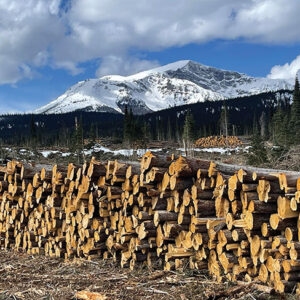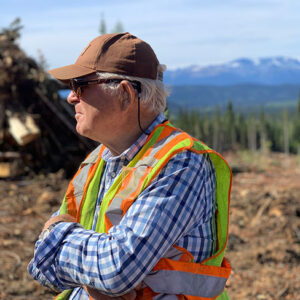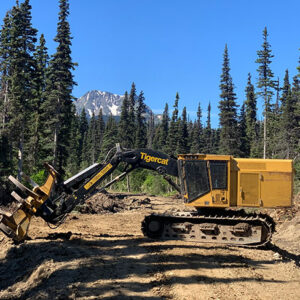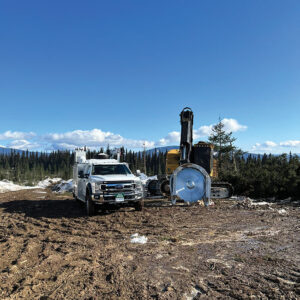
Features
Logging Profiles
A log/love story: Fink’s Sawmill’s 60-year history
June 29, 2023 By Jennifer Ellson
 (L-R): Rylan Smaha-Muir, Brent Muir, Shari Smaha, Myron Smaha, Frances Smaha, Lorelei Smaha and Ryan Klaver. Photo courtesy Smaha family.
(L-R): Rylan Smaha-Muir, Brent Muir, Shari Smaha, Myron Smaha, Frances Smaha, Lorelei Smaha and Ryan Klaver. Photo courtesy Smaha family. Somewhere in Smithers, B.C., is a family-run company with a 60-year history and a 60-year love story.
It was in early 1950s when Bernhard Fink, originally a gold miner in Barkerville, B.C., moved to the Hazelton area and started cutting timbers for the underground tunnel supports for local area mines. Along with his daughter Frances and son-in-law Myron Smaha, Bernhard went on to establish a small sawmill and log harvesting business in Smithers, B.C.
“My parents were both teachers, and at night and week-ends, my dad helped his father-in-law in the operations,” says Shari Smaha, Myron and Frances’ daughter. “Both my grandparents passed away at an early age and in the mid-1960s my parents took over the company.”
Not only did Fink’s Sawmill Ltd. celebrate its 60th anniversary last November, but Myron and Frances are celebrating their 60th wedding anniversary this August.
A true family affair
The company recently celebrated 60 years since incorporation on Nov. 26, 1962. Today, the sawmill is gone but the name Fink’s Sawmill Ltd. lives on as a stump-to-dump logging company. Almost the whole family is now involved, and the 84-year-old Myron is still active in the company, while his 83-year-old wife, Frances, helps in the office and gathers her family around her dinner table every Sunday night.
“My dad is out building roads! He’s always engaged, and his mind is always thinking about the business,” says Shari, who joined the company in 1993 after completing a diploma in financial management. She is currently the office manager. She is currently the office manager. Her brother-in-law, Ryan Klaver, who joined in 2002, holds the bush foreman position. Shari’s son Rylan takes on the heavy-duty mechanic role, along with experience as an operator in bunching, skidding and roadbuilding phases.
“We’re a four-generation family business working together with the goal of carrying on Fink’s Sawmill Ltd.’s existence in this challenging environment,” Shari says.
Six decades of business and busy-ness
Fink’s Sawmill does some 15-20 km of roadbuilding per year. Myron has arranged an impressive mix of roadbuilding equipment comprising a Link-Belt 350X3 excavator with a 72” clean-up bucket, a Cat D6R and a Cat 324D excavator, a Komatsu PC200LC-6, a John Deere D5H track skidder with grapple and a John Deere D5H track skidder with swing boom. The company also has a Komatsu D85 dozer with U-Blade.
Fink’s harvests a diversity of species – pine, spruce and balsam – totalling around 140,000 cubic metres annually. The company does full tree to roadside logging averaging around 0.50 cubic metre per tree of long and short sawlogs, pulp shorts and dry shorts.
The pulp chips are sent to Pinnacle Renewable Energy’s nearby Smithers pellet plant, while the dry shorts are sent to neighbouring Seaton Forest Products, which produces dry balsam logs into cants and shipping them to a reman facility in Langley.
Fink’s supplies around 113,000 cubic metres annually to Pacific Inland Resources, a division of West Fraser Timber. The average haul distance from Smithers to Pacific Inland Resources has a five-hour cycle, Shari says, and the average skidding and forwarding distance is dependent by block.
The distance from Smithers and the Pacific Inland Resources mill necessitates a camp situation for the loggers, according to Shari.
“Our crew stays in individual campshack with camp allowance,” she explains. The crew works a 54-hour work week: 12-hour shifts from Monday to Thursday, and eight hours on Friday. The company employs 14 bush staff and truck drivers. In addition, it hires subcontractors for the trucking and loading phase.
Fink’s has two feller bunchers: a Tigercat 870C and Tigercat X870D. The company’s skidding workhorses are two John Deere 848Hs, one with wide tires; a Tigercat 625C six-wheel skidder, a new Tigercat 635H six-wheel skidder, a John Deere D5H track skidder with grapple, and a John Deere D5H track skidder with swing boom.
“In early 2023, we purchased a 2022 Tigercat 635H 6×6 skidder through Ritchie Bros. to replace existing old skidders and for use in deep snow. We just picked it up in April, so time should tell how it works out in our operation,” Shari tells CFI.
The decking line-up includes a Tigercat 880 and a Link-Belt 290 log loaders. The log processing line-up at roadside consists of a new Tigercat 850 with a Tigercat head, two Link-Belt 210s with Southstar QS500 heads, and a Cat 320D, also with a Southstar QS500 head.
“We were in the market for a machine that could handle larger piece size, and Parker Pacific brought the Tigercat 850 out as a demo, and the machine ended up staying,” says Shari.
“Bigger head, bigger machine, less downtime. According to Blair Morgan, our long-term operator who has been a part of Fink’s crew for 28 years, says it has lots of power, handles big wood with no problem, good visibility and the best machine he has ever ran. There’s also easy access for repairs as compartments opens up to make it easier to work on,” she explains.
Loading is subcontracted out to meet the loads per day requirements. Fink’s Sawmill operates three new Kenworth tridem tractor logging trucks with two Freflyt tridem trailers and one Arctic tridem trailer, as well as a Kenworth and a K-Line lowbed. Fink’s has a fleet of Ford crew cabs and a Ford F550 with Brutus service box for other support duties.
Challenges a plenty
It is no secret that the forest industry, particularly in B.C., is full of challenges lately.Shari says the current low lumber market prices that resulted in mill curtailments are reducing the need for harvesting and thus creating uncertainty.
In addition, the B.C. policies concerning the stumpage system, adjustment in the allocation within the allowable annual cut, and old-growth deferral are having an effect on forestry companies like Fink’s Sawmill.
“We see the major licensees invest outside of BC in areas of Alberta and southern US which is very concerning. Logging and hauling rates are not keeping up with increased costs and inflation creating further added pressure and uncertainty on contractors such as ourselves,” Shari says.
“So many factors which are out of our control affect our ability to work, such as our mill’s ability to move their lumber to market is affected due to interruption in logistics, such as services provided by CN Rail,” she explains.
Another challenge is labour shortage, which is crucial to the company’s operations, according to Shari.
“Skilled operators are the No. 1 asset in our company.”
Family values
The family is proud of their excellent relationship with their staff, suppliers and area contractors, which Shari says is the secret to Fink’s Sawmill’s longevity and success.
“Open communication, good working and long-term relationship with our mill, our suppliers, and our logging and trucking contractors are critical,” she adds.
“The message that I would love to share with CFI readers is the success, determination, work ethic that my parents have. They are providing employment to many families, they are hardworking, honest, fair people. Their 60 years in business in this industry is quite a gem of accomplishment,” Shari shares.
Indeed, Myron and Frances’ 60 years of running the family business, and 60 years of togetherness is a massive feat and cause for a celebration.
Print this page



